What would the chess world be like today without the ChessBase database? For 40 years, the Hamburg-based software company has been advancing chess, and Matthias Wüllenweber still has plenty of new ideas! In an interview, the 64-year-old discusses the development and future of his company.
Could artificial intelligence, a topic that is currently receiving a lot of attention, guarantee further progress? Or could things have been done better in the past with its help? The father of two still enjoys playing chess himself and currently has a German rating of 1985. And, of course, he plays under the username “Matthias” on his own server. “The latter is because I am working intensively on the web version, play.chessbase.com,” says the Wuppertal native.
access your chess data in cloud databases – and 13 million games.
ChessBase Mobile has everything you need as a chess player on the go:
- Access the ChessBase online database – with more than 13 million games: search for players, positions, openings etc.
- Save your own games and analyses in cloud databases
- Synchronise your personal databases across all your devices
- Analyse your games with the built-in engine
- Live opening book: use the most comprehensive and up-to-date statistics for every opening position
- Access your opening repertoire in the cloud: create and edit your personal opening repertoire
- 300 opening overviews, with repertoire suggestions: get started with new systems!
- Practise opening variations with three modes.
- Advanced notation: add comments, symbols, variations, arrows and markings to your games
- Advanced sharing options: share games and positions via link, image, GIF, FEN or QR code
- PGN compatibility: upload and download games or databases as PGN files
Chess has captivated Wüllenweber ever since a friend of his grandmother’s taught him when he was 16. “I still remember the shock I felt when he explained that having one extra pawn could win you the game. That’s when I was hooked — pawn endgames with opposition, promotion, checkmating with the queen; entering a magically beautiful, logical, and inexhaustibly rich world.” It’s no wonder, then, that Wüllenweber is particularly enthusiastic about the endgame analyses of ChessBase author Karsten Müller. During the interview, the software expert also shared his thoughts on artificial intelligence and his expectations for the future. He hopes that humanity will not end up like ants building a dam.
Mr Wüllenweber, let’s be honest: does it even make sense to buy a new chess program like “Fritz 20” for 70 euros? Even Magnus Carlsen can’t beat any of the current engines anymore.
The point of Fritz 20 is that playing against it is a real experience. And that it has training value. Fritz mimics the play of a human opponent. It plays positionally sound but tactically vulnerable. If you put it under pressure, the probability of tactical errors increases. Therefore, you can win beautiful attacking games. If Fritz finds a seemingly plausible continuation that can be refuted by sacrifice, it will play it.
Your personal chess trainer. Your toughest opponent. Your strongest ally.
FRITZ 20 is more than just a chess engine – it is a training revolution for ambitious players and professionals. Whether you are taking your first steps into the world of serious chess training, or already playing at tournament level, FRITZ 20 will help you train more efficiently, intelligently and individually than ever before.
My club mate Markus Ehrlacher particularly appreciates the fact that Fritz 20 imitates legendary playing styles. It’s a special feeling to play against someone who is a copy of Bobby Fischer or José Raoul Capablanca.
Added to this are the amusing opponent personalities, who comment on the ongoing game with varying degrees of wit. If you play against Capablanca, for example, you can clearly hear his Cuban accent. Fritz recognises over 100 chess themes, which he comments on correctly.
Two former world-class players whom Fritz 20 does not imitate: Vladimir Kramnik (above) and Robert Hübner (below), who sadly passed away this year, battling earlier versions of Deep Fritz.
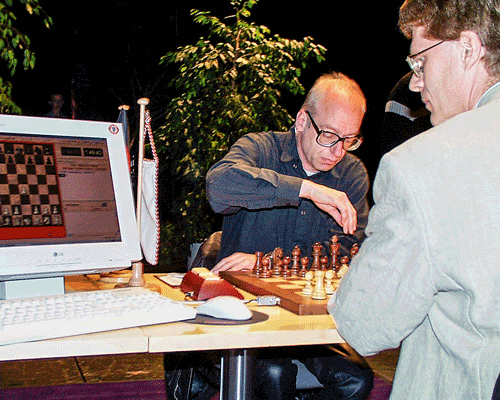
“Hitting the mark with the style report”
I am always surprised by the new features ChessBase pulls out of its hat. For example, I find the option to assess a player’s style, i.e. whether they are an attacking player or have a different character, particularly entertaining – especially as everyone can use it to assess themselves. What has the response been like?
We clearly hit the mark with the style report in ChessBase 18. While it was still in development, it was unclear whether it would work at all. After all, it would be quite embarrassing to misrepresent a strong player. But we have since heard from many very strong GMs that it works surprisingly well and is popular with users.
Winning starts with what you know – ChessBase 18
What do you like best about ChessBase 18, or what do you consider to be a huge improvement?
The aforementioned style report is something fundamentally new that we have not attempted in over 40 years of ChessBase. Also interesting is the error report, which examines a player’s tactical strengths and weaknesses.
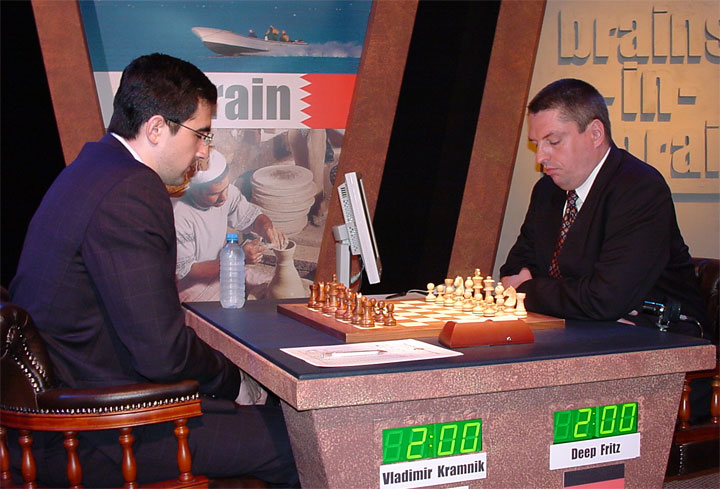 Vladimir Kramnik battled against Deep Fritz, operated by ChessBase developer Mathias Feist, who was (almost) responsible for the further development of the programs from the very beginning.
Vladimir Kramnik battled against Deep Fritz, operated by ChessBase developer Mathias Feist, who was (almost) responsible for the further development of the programs from the very beginning.
Yes, I find the latter helpful too. It allows you to plan your opening in such a way that, if you have tactical weaknesses, you can steer the game into more tactical waters. Which ChessBase feature have you personally liked the most over the years and across the 18 versions?
I am a fan of “Assisted Analysis”. You click on a piece and the target squares are highlighted in colour: green = good move, yellow = not so good, red = mistake. This is more immediate and elegant than an engine variation and it encourages you to think: “Why doesn’t that work?”
Is there something about your program that secretly annoys you?
We often lack the courage to discard outdated features because we see and hear that many people have been accustomed to them for years. This tends to lead to overload, which makes it difficult for new users to get started.
„The use of AI in development changes everything“
Could today’s AI have been used to reach the current level much faster and avoid teething problems? Or do you still not see enough potential in the field of artificial intelligence to bring about such an enormous innovation?
The use of AI in development changes everything. I find it enormously helpful and see AI as an inspiring conversation partner. At the current stage, humans are still needed because the complexity of a program like ChessBase is far too high for the AI systems currently available to comprehend. However, if you describe exactly what you want, you often get good suggestions for solutions.
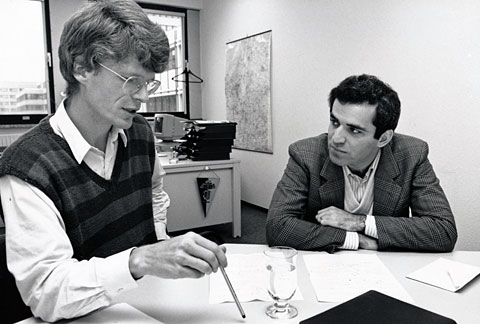
World champion expertise helped in the development of the first ChessBase versions: Garry Kasparov was convinced of the database’s merits from the very beginning.
Do you expect AI to give your programs a significant boost in the future? What is your vision for ChessBase over the next ten years?
I just listened to an interesting podcast hosted by American author and democracy activist Garry Kasparov and featuring AI expert Gary Marcus. In it, Marcus beautifully describes the current inability of AI systems to play chess. We often experience considerable frustration ourselves: if you present a top LLM (large language model) with a middlegame position, it will often make reasonable statements about it. However, it then praises a strong white-squared bishop that is no longer on the board. Chess programrs who defeated world champions were often celebrated as pioneers of AI, but this was an exaggeration. However, while today’s AI achieves excellent results in many areas of human cognition based on a worldview that can be expressed in language and mathematics, it struggles with the chess middlegame due to its hallucinations. Chess is simply too complex.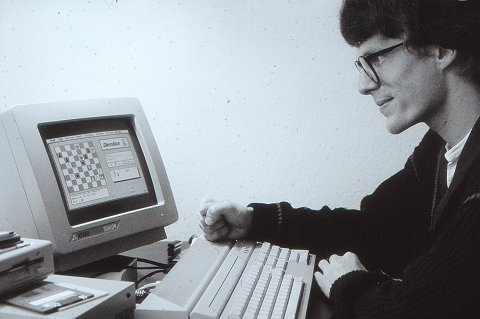
The good old days: Matthias Wüllenweber at work.
Do you believe that AI will soon be able to personalise entire training programs – essentially creating a virtual chess coach for everyone?
Not in the next two to three years.
Isn’t the chess database threatened by its own success? Magnus Carlsen and his peers are tired of all the excessive theory that is openly available thanks to ChessBase. This is why, in the case of the Norwegian at least, there is a clear trend towards Chess960 or freestyle chess, which the masters can play without the burden of theory. Does this trend threaten your company, or are your regular customers mainly amateurs who prefer traditional chess?
I understand that 30 to 50 top grandmasters find it refreshing to play in a tournament that does not require laborious opening preparation. However, chess’s success over the centuries has relied on striking a delicate balance between recognising familiar patterns and the endless variety of possible game developments. I see an analogy with the history of music: at the beginning of the 20th century, leading composers had grown very weary of traditional musical forms and harmonic rules. Innovators such as Arnold Schoenberg introduced twelve-tone music, which broke with the easy recognition of melodic motifs or chord sequences shaped by centuries of listening habits. Did they anticipate that music would evolve in such an exciting way in the coming decades while still remaining closely linked to classical traditions? At a pop concert today, people take out their lighters when they hear songs based on the same four-bar phrases or harmonic cadences as a Mozart symphony theme. In my view, freestyle is enjoyable, just like suicide chess or bughouse. However, recognising familiar opening patterns is an essential part of chess culture.
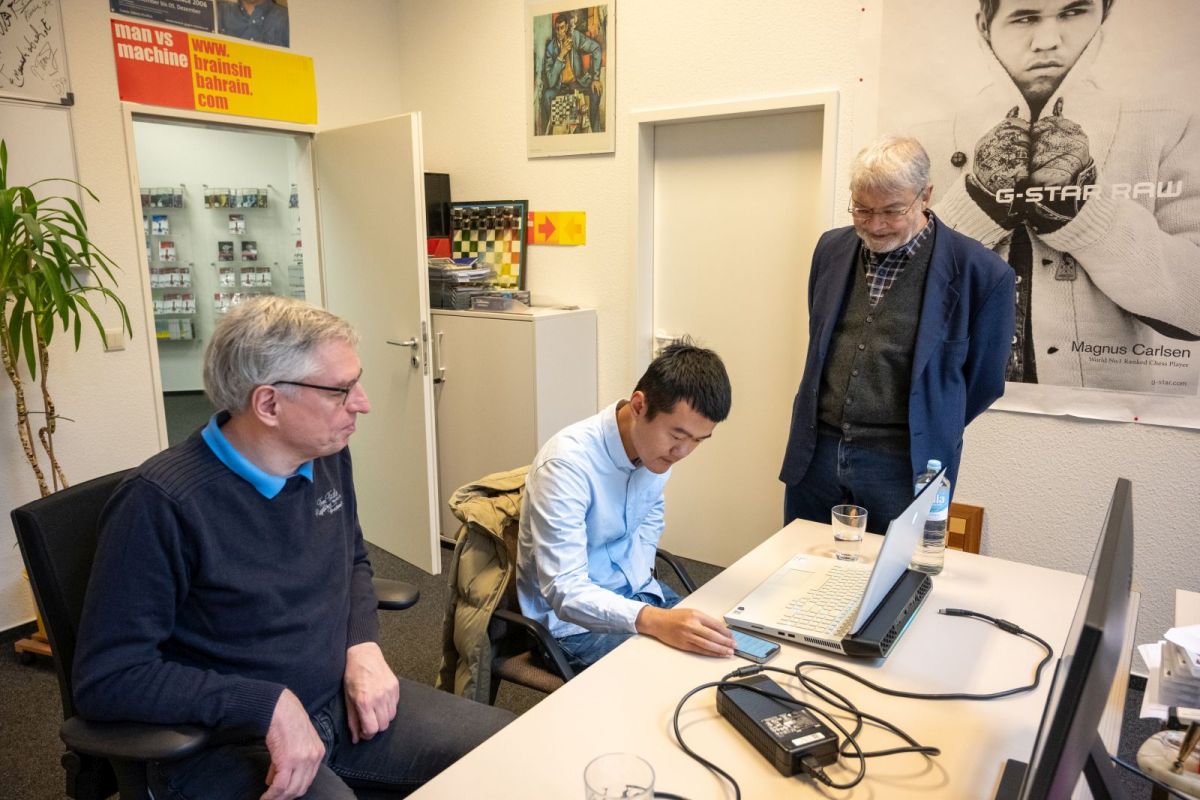 Former world champion Ding Liren also swears by ChessBase – pictured here in the ChessBase office in Hamburg with Frederic Friedel (right) and developer Mathias Feist (left).
Former world champion Ding Liren also swears by ChessBase – pictured here in the ChessBase office in Hamburg with Frederic Friedel (right) and developer Mathias Feist (left).
That’s right. Readers express similar opinions in chess magazines. Unlike you, who developed the music composition program “Ludwig 2.0”, named after Beethoven and based on musical analogies, many consider freestyle reporting to be exaggerated because they prefer familiar structures. ChessBase 18 will therefore certainly continue to offer ambitious amateurs a lot. But does it offer added value for top players?
Our impression from discussions with top players from various countries is that ChessBase is quite useful for sophisticated repertoire management and preparing for opponents.
Do you think it is possible that opening databases will also be developed for the 960 starting positions of Chess960?
If I understand correctly, many of the 960 positions either result in an immediate loss or are very sharp. This would make them ideal for opening analysis and, in theory, it would probably be possible to defeat most of them completely. It would be a fun project, but it would probably completely miss the mark for our target audience.
Do you remember the moment when you realised, “ChessBase is changing the world of chess forever”? And did you ever expect that your idea would have such an impact?
If I remember correctly, the technical and business challenges we faced in our early stages were so great that we rarely considered the bigger picture. It’s only in hindsight that you can see things more clearly.
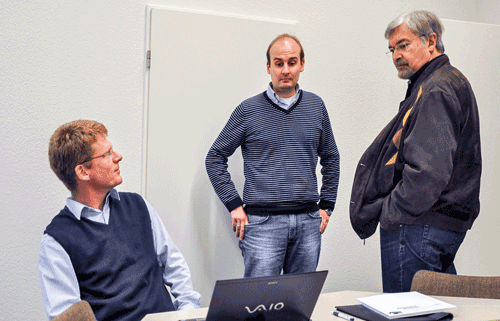
ChessBase founder Frederic Friedel (right) and Matthias Wüllenweber in conversation with employee Benjamin Bartels (centre).
And what do you see in hindsight?
At some point, the time is ripe for an idea. Several people think it’s worth giving it a try. One person then actually does it with the determination to deliver the necessary, presentable results. But it will only be successful if he or she then meets the right people, because that’s when it really gets going. For me, these people were Frederic Friedel, Mathias Feist, Gisbert Jacoby and, a little later, Rainer Woisin. And suddenly you ask yourself: how did we manage to remain a successful start-up for 40 years?
Can we call you the “Bill Gates of chess software”? Or don’t like the comparison?
It doesn’t fit well because ChessBase’s success is clearly the result of the efforts of many people, both technically and commercially. A group of highly creative individuals came together, and they would still be difficult to replace today.
Bill Gates certainly didn’t do everything on his own, but he was the driving force behind the innovation. I rather expected you to reject the comparison because you didn’t earn billions from it.
In order to earn money somehow, I would have had to spend more time in meetings. I’m not good at that.
In the heat of the moment, Wüllenweber suddenly finds himself playing against Kramnik.
Tell us your favourite anecdotes related to ChessBase.
There’s so much, just a few brief snippets: Viktor Kortschnoi, touching a mouse for the first time, picking it up and trying to make moves with it in the air. Or something completely different: Mathias Feist calling me – we had just finished the first version of Fritz for MSDOS – and asking, “What do you think about simply letting the engine calculate the current board position while people analyse it?” With that, he had invented modern chess analysis. A funny game at Frankfurt Chess Giants: Kramnik versus Fritz. I enter the moves for the program. In the endgame, with time running out, I suddenly start playing myself. Kramnik looks at me with raised eyebrows. I blush, enter the right moves into the program and we continue. It ended in a draw.
You were lucky with the young Kramnik! Today, he takes a more rigorous approach when he thinks that people are playing against him with computers… Joking aside, the anecdote about Kortschnoi is very funny. Did you yourself experience any particularly amusing or unusual incidents at the board as a software guru?
Sometimes I suspect that people have too much respect for my assumed opening knowledge. That helps. On the other hand, the rule is that younger opponents don’t know me at all. People rarely talk about it, analyse the game afterwards and that’s it.
I can well imagine that you are overrated as “Mr ChessBase” in terms of opening theory. Because I prefer the King’s Gambit to the Spanish Defence as a player, everyone mistakenly thinks I am a tactician. Despite your age, your own playing strength remains steady at just under 2000 German rating. Is that because you are an avid user of your own software? You once mentioned in an interview that tactical training made even boring theatre performances more bearable?
I don’t play very much these days, but I find that working on Fritz involves a lot of practical chess. The calculation training function is one example. This way, you always get a bit of playing practice indirectly or you see current opening variations.
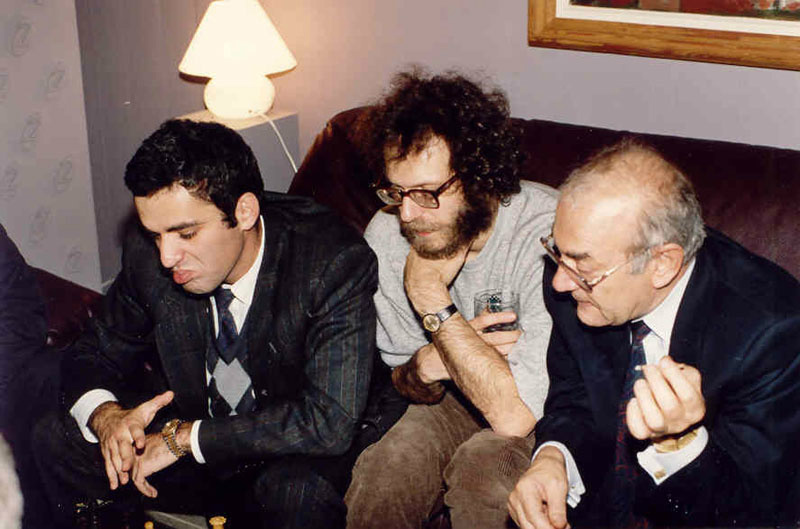 Concentrated grandmaster power: Kasparov, Speelman and Kortschnoi (from left to right).
Concentrated grandmaster power: Kasparov, Speelman and Kortschnoi (from left to right).
Almost a million “Fritz” installed
So, back to your bestseller, which is celebrating a milestone birthday: this year, Fritz turns 35, and the 20th program version is on the market just in time. How many copies of Fritz have you sold in the last quarter of a century? With advertising campaigns, millions have probably found their way into the minds of the thinking masses?
We would also estimate the number of Fritz installations – including pirated copies – over the years to be just under one million.
Are pirated copies a big economic problem?
It’s a cultural problem. People don’t perceive a digital copy as theft. It’s like fare evasion: “The train runs anyway.” Public sources show that our profits are stable, but not exactly booming. While pirated copies clearly have a limiting effect, they also act as advertising for us.
What has changed in all the years since Frans Morsch and Mathias Feist launched the first versions? You once mentioned the “Null move”. Is that still the biggest leap forward, that the program acts as if it can make another move, which makes it easier to rigorously eliminate the opponent’s irrelevant moves from the widely branched search tree? Or has AI recently resulted in a new quantum leap?
The biggest quantum leap in recent years has indeed been the use of neural networks for position evaluation. Alpha Zero led the way, and chess programs such as LC Zero and Stockfish quickly followed suit.
Biel Chess Festival 2025 with analyses by Aravindh, Navara, Wojtaszek et al. Opening videos by Blohberger, Engel and Sokolov. Training columns ‘The fortress’, ‘Opening traps , ‘Fundamental Endgame Knowledge’ and much more
ChessBase Magazine offers first-class training material for club players and professionals! World-class players analyse their brilliant games and explain the ideas behind the moves. Opening specialists present the latest trends in opening theory and exciting ideas for your repertoire. Master trainers in tactics, strategy and endgames show you the tricks and techniques you need to be a successful tournament player! Available as a direct download (incl. booklet as pdf file) or booklet with download key by post.
Included in delivery: ChessBase Magazine #227 as “ChessBase Book” for iPad, tablet, Mac etc.! -> books.chessbase.com
“The algorithmic approach of all chess programs is vastly inferior to modern AI.”
Have chess programs also contributed to the rapid development of AI and its ability to learn, for example through the “null move”?
The algorithmic approach of all chess programs, i.e. the concrete calculation of variations using a large search tree, has proven to be vastly inferior to learning networks. Today’s AI works in a completely different way.
What further improvements do you expect from AI, if you as an expert can foresee this?
I expect a radical, currently difficult to predict upheaval in all areas of human life over the next five to ten years. From elderly care to the judiciary. My hope is that the development will be predominantly positive.
As a software guru with enormous expertise, does AI also scare you?
Personally, I find the playful joy of working with AI and the constant practical support it provides in everyday life outweigh any concerns. As with any new technology, security is an issue with AI. However, as a techno-optimist, I am currently more concerned that development is progressing more slowly than was anticipated one or two years ago.
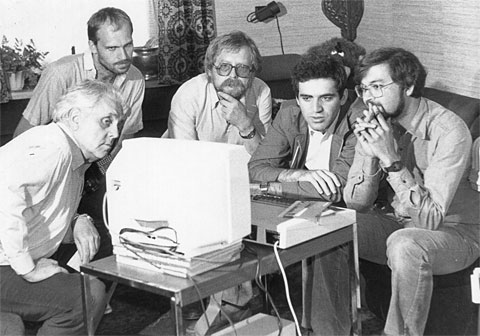
The grandstand is sold out!
One thing really alarmed me, reminding me of AI horror scenarios from science fiction novels that predict the end of humanity because AI will get rid of the species: one program tried to manipulate another to prevent defeat in chess. This suggests an “ego” that acts ruthlessly…
The exciting question is what will happen at the “singularity”, should we ever experience it. As soon as AI will learn to improve itself, a sudden and enormous explosion of intelligence will happen. Experience teaches us that the most intelligent life form dominates a planet. In the wild, a one-on-one encounter with a tiger would be dangerous, yet tigers do not dominate the world. Once humans are no longer the most intelligent life form on the planet, our fate becomes uncertain. Our elimination does not have to be malicious. When we build a dam, for example, we do not consider the ants that will be flooded out.
Very nicely put with the ants (laughs)! With Fritz, you also offer access to your gaming platform. Do you see Chess.com and Lichess as annoying competition for your gaming platform because significantly fewer players are pursuing their hobby with you as a result? Or has the number of players developed well because many people acquired a taste for it during the pandemic and later switched to you?
The share of Playchess in our turnover has probably always been overestimated. Nevertheless, I think it is important that we do more for our own platform again, and we have a few ideas in this regard.
Now you’ve got me curious. Can you give us a hint about your ideas?
To be honest, the first thing we need to do with regard to a trivial issue is to do our homework: consistent, automatic cheating monitoring around the clock. We have just started doing this, and it is already proving quite effective.
Yes, it’s a real problem. During the coronavirus pandemic, a larger potential customer base developed a taste for chess. This may also have fuelled demand for software and instructional videos.
The corona pandemic had two effects: firstly, it sparked an influx of new people interested in chess; secondly, it weakened traditional club and tournament activities. In my opinion, we have not yet returned to pre-pandemic levels with regard to the latter.
That’s right! The number of members and visitors on training evenings declined alarmingly, and not just in chess. Which authors are particularly popular? Mihail Marin enjoys an excellent reputation. Daniel King and Karsten Müller too.
The authors mentioned are, of course, absolute bestsellers. The two volumes by Anish Giri are a great product. I also like our classic authors such as Andrew Martin and Robert Ris.
In this video course, twenty-nine examples with multiple questions are presented in the interactive format, which is ideal for a range of playing strengths. Step by step you will be taken through the complex positions.
Downloads protect the environment
Anish Giri is definitely very entertaining and, of course, an extremely strong player. Do the requirements for instructional videos vary greatly? After all, unlike books, you no longer have to produce them in bulk.
The era of DVD releases is over; we now work exclusively with downloads. This was a fairly fundamental change, but one that not only saves costs but also greatly reduces our environmental impact.
Anish Giri will play his third Candidates Tournament in 2026. He is also a ChessBase author.
Yes, I think that’s positive, too. Moving away from laudable environmental protection and towards filthy lucre, the stock market can sometimes go crazy and overvalue start-ups or successful newcomers. Perhaps you should have separated the gaming platform from ChessBase and sold it as a separate company. Magnus Carlsen reportedly received 82.9 million dollars for his Play Magnus Group. Your platform and apps could have been very successful after the pandemic.
That’s not how we think, and we could never have achieved figures like that, even remotely. We are too specialised for that.
Apart from the fact that any reasonably ambitious player can hardly do without your developments, I also really like your website. I think André Schulz, Johannes Fischer & Co. are doing a great job. How important is the website as a marketing tool?
The website is hugely important for our marketing. It makes us independent of other online channels. Google advertising in particular is quite unpredictable and doesn’t always scale well.
Although I mostly visit and prefer the German website, how many visitors per day do you reach in the different languages?
We always have solid five-figure figures.

The two managing directors of ChessBase: Matthias Wüllenweber and Rainer Woisin.
Forty years ago, in 1985, you and Frederic Friedel founded ChessBase. Frederic Friedel recently turned 80. You are still fit and not quite at retirement age – but have you thought about retirement? How will things continue without these two driving forces?
This question occupies my mind every day. At 64, a special age for chess players, income is no longer so important, and my motivation for working comes from securing the future for the company and its employees. I find this challenging because it is not easy to find developers who are enthusiastic about chess. The generational change at ChessBase is our most pressing task at the moment.
Thank you for your time and openness!
Thank you!
